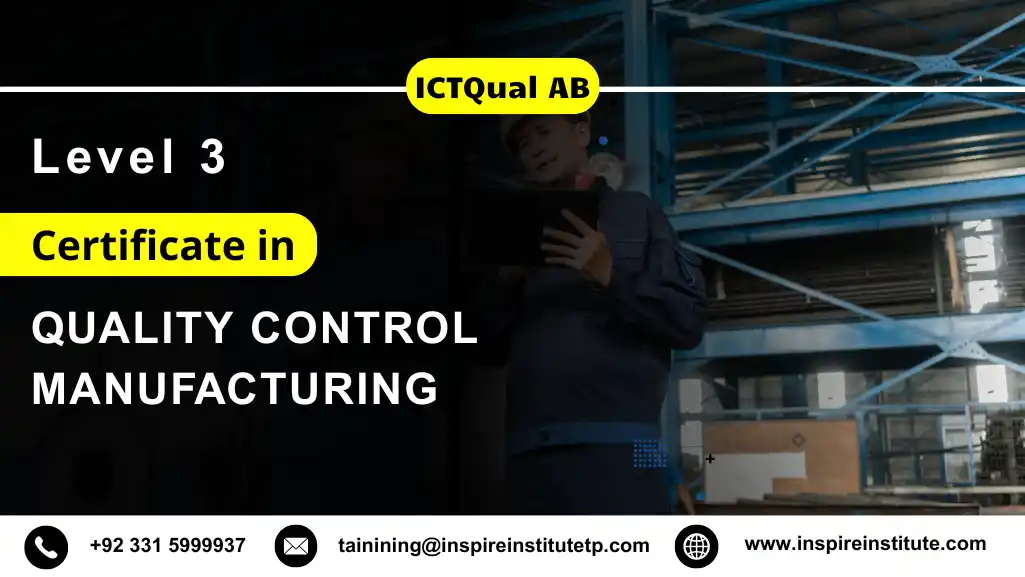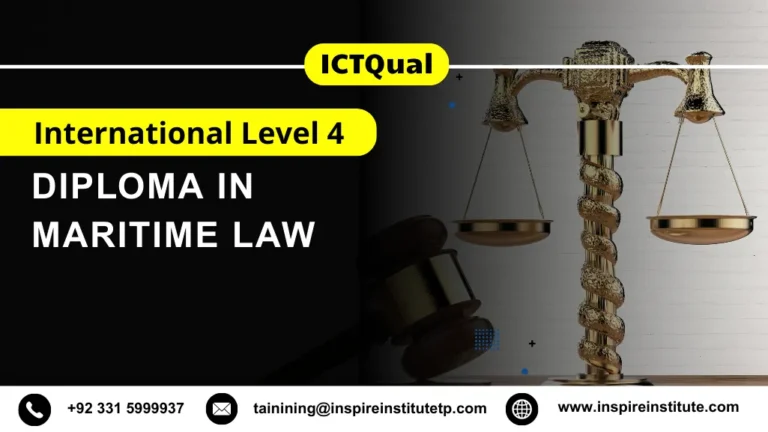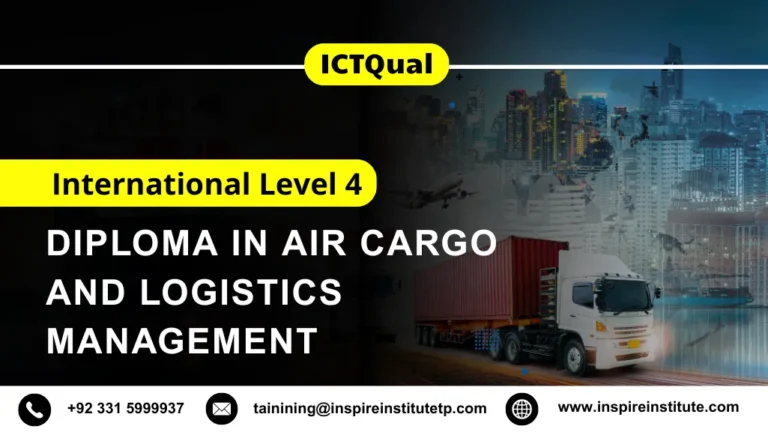ICTQual AB Level 3 Certificate in Quality Control Manufacturing
The ICTQual AB Level 3 Certificate in Quality Control Manufacturing equips learners with the essential skills to monitor, inspect, and maintain quality standards in manufacturing environments. The programme covers key areas such as quality assurance principles, regulatory compliance, inspection techniques, and process monitoring. Upon completion, learners are prepared to contribute effectively to manufacturing operations by ensuring consistent product quality and adherence to industry standards. Learners will be able to apply quality control measures, monitor production standards, and maintain efficiency and compliance in manufacturing operations.
The ICTQual AB Level 3 Certificate in Quality Control Manufacturing is a nationally recognised qualification designed to provide learners with foundational knowledge and practical skills in manufacturing quality assurance. This certificate is suitable for individuals entering the field, as well as professionals aiming to enhance their employability in production and quality management. Quality control is a vital aspect of the manufacturing industry, ensuring products meet high standards, regulatory requirements, and customer expectations. Learners can also progress to higher-level qualifications, such as Level 4 or Level 5 diplomas in quality control or manufacturing leadership.
Why Choose this Qualification
The ICTQual AB Level 3 Certificate in Quality Control Manufacturing is an excellent choice for individuals aiming to build foundational skills and establish a career in manufacturing quality control. Key reasons to choose this certificate include:
- Foundational Knowledge: Gain essential understanding of quality control principles, inspection methods, and manufacturing processes.
- Practical Skills Development: Learn to monitor, inspect, and evaluate production workflows effectively.
- Regulatory Compliance Awareness: Acquire the skills to ensure manufacturing processes meet UK industry standards and regulations.
- Enhanced Career Opportunities: Improve employability for operational roles such as Quality Control Officer, Production Assistant, or Laboratory Technician.
- Pathway to Advanced Qualifications: Provides a stepping stone to Level 4 or Level 5 diplomas in quality management, manufacturing supervision, or leadership.
- Industry-Relevant Training: Designed to meet the practical needs of manufacturing environments, enabling learners to apply skills immediately in the workplace.
Choosing this ICTQual AB Level 3 Certificate in Quality Control Manufacturing demonstrates a commitment to maintaining high-quality standards in manufacturing and prepares learners for career progression within the industry.
Course Overview
Awarding body : ICTQual AB
Course Level: 3
Credits : 10
Study Units: 3 Units
Evidence & Assignment Based
Qualification Structure
This qualification, the ICTQual AB Level 3 Certificate in Quality Control Manufacturing, consists of 3 mandatory units.
- Fundamentals of Quality Control in Manufacturing
- Inspection Techniques and Measuring Instruments
- Product Defects, Non-Conformities, and Corrective Actions
Who Should Take This Course
The ICTQual AB Level 3 Certificate in Quality Control Manufacturing is designed for individuals seeking foundational knowledge and practical skills in quality control within manufacturing environments. This course is suitable for:
- Production and Manufacturing Staff: Individuals involved in production who want to understand and maintain quality standards.
- Quality Control Assistants or Officers: Professionals aiming to formalise their skills in inspection, monitoring, and reporting.
- Laboratory Technicians: Personnel responsible for product testing or monitoring who wish to gain recognised certification.
- Aspiring Quality Control Professionals: Learners planning to start a career in manufacturing quality assurance or compliance.
- Beginners in Manufacturing Quality: Individuals with little or no prior experience who want to establish a strong foundation for career progression.
By taking this ICTQual AB Level 3 Certificate in Quality Control Manufacturing, you equip yourself with the foundational knowledge and practical skills required to succeed in food quality assurance and open pathways for further career development.
Course Benefits
Enrolling in the ICTQual AB Level 3 Certificate in Quality Control Manufacturing offers several advantages for learners seeking to establish or enhance a career in manufacturing quality control:
- Foundational Knowledge: Gain essential understanding of quality control principles, inspection techniques, and manufacturing processes.
- Practical Skills Development: Learn to monitor, inspect, and evaluate production workflows effectively.
- Regulatory Compliance Awareness: Acquire the skills to ensure processes meet UK industry standards and regulations.
- Enhanced Employability: Strengthen career prospects for operational roles such as Quality Control Officer, Production Assistant, or Laboratory Technician.
- Pathway to Advanced Qualifications: Provides a stepping stone to Level 4 or Level 5 diplomas in quality management, manufacturing supervision, or leadership.
- Industry-Relevant Training: Apply the knowledge and skills directly in manufacturing environments to improve product quality and operational efficiency.
Completing this ICTQual AB Level 3 Certificate in Quality Control Manufacturing equips learners with practical knowledge and confidence to contribute effectively to quality assurance in manufacturing, making it a valuable step in career development.
Eligibility Criteria
Candidates wishing to enrol in the ICTQual AB Level 3 Certificate in Quality Control Manufacturing should meet the following requirements:
Educational Background: Level 2 qualifications in a related subject are recommended but not mandatory.
Work Experience: Relevant experience in manufacturing, production, or quality control is advantageous, though beginners can also enrol.
Technical Skills: Basic understanding of manufacturing processes, quality monitoring, and data recording is beneficial.
Language Proficiency: Adequate English skills are required to understand course materials, complete assessments, and communicate professionally.
Minimum Age: Participants must be at least 16 years old.
The Qualification Process
The ICTQual AB Level 3 Certificate in Quality Control Manufacturing follows a structured and learner-friendly qualification process that blends academic study with real-world coaching skills. The process is designed to develop competent, ethical, and client-focused health coaches who are capable of supporting others in achieving sustainable lifestyle changes. Below is an overview of the key stages in the qualification journey:
• Admission and Enrolment
Learners begin by applying through an approved ICTQual AB training provider, where they must:
• Submit proof of identity and academic qualifications (typically Level 3 or equivalent)
• Demonstrate proficiency in English (e.g., IELTS 5.5 or equivalent)
• Complete a personal statement or interview (where required) to assess interest in health and wellness coaching
Once approved, learners are formally enrolled and given access to course resources.
• Course Orientation
New learners receive a full orientation that includes:
• An introduction to the course structure, units, and learning outcomes
• Guidelines on assignments, deadlines, and tutor support
• Information about coaching practice expectations and ethical conduct
• Programme Delivery
The course is delivered through a flexible format, which may include:
• Online, blended, or classroom-based learning
• Interactive webinars and tutorials
• Independent reading and research
• Practical exercises and case studies
This delivery style supports learners in balancing their studies with work or personal commitments.
• Core Areas of Study
Learners explore a broad and practice-driven curriculum, including:
• Foundations of health coaching and behaviour change
• Goal setting and action planning
• Motivational interviewing and communication strategies
• Health promotion and wellness concepts
• Coaching ethics and professional boundaries
• Reflective practice and personal development
• Coaching Practice
Though not always mandatory, learners are encouraged to:
• Apply coaching tools in real or simulated sessions
• Record and reflect on client progress
• Gather feedback to improve coaching performance
Some training centres may also include practical assessments, role-plays, or coaching portfolios.
• Assignments and Assessments
Assessment is based entirely on coursework. Learners are required to:
• Complete written assignments, reflective journals, and coaching session plans
• Submit case studies and progress reports
• Demonstrate understanding of theory through practical application
• Present evidence of learning in a structured portfolio
• Tutor Support and Feedback
Throughout the course, learners benefit from:
• One-on-one academic guidance
• Regular tutor feedback on assignments
• Coaching supervision or mentorship (depending on provider)
• Access to learning platforms and study materials
• Internal and External Quality Assurance
All assessments are:
• Internally verified by the training provider
• Externally quality-assured by ICTQual AB to ensure fair grading and regulatory compliance
This two-tier system maintains the academic integrity and credibility of the qualification.
• Certification
Upon successful completion of all course units and submission of required evidence, learners are awarded the ICTQual AB Level 3 Certificate in Quality Control Manufacturing.
• Post-Qualification Progression
Graduates of this diploma can:
• Begin or advance a career as a Quality Control Manufacturing
• Work in private practice, community health programmes, or corporate wellness
• Progress to higher-level coaching or health-related qualifications
• Seek accreditation with national or international coaching bodies (subject to additional requirements)
This structured process ensures learners graduate with the practical confidence, professional standards, and academic grounding needed to thrive as ethical and effective health practitioners in a growing global wellness industry.







